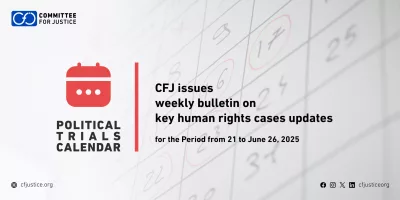The state of emergency has become the dominant feature in Egypt under the various ruling regimes since the end of the nineteenth century until now. The continued application of the state of emergency in Egypt has led to the accumulation of abuses and the increase in human rights violations, including basic rights, according to the Committee for Justice (CFJ).
This was the conclusion of a detailed analytical study prepared by CFJ’s Trial Watch project, entitled “Endless Emergency: An Analytical Study of the State of Emergency in Egypt and Its Effects”. The paper analyzed the Egyptian state of emergency throughout history and its devastating effects on human rights in the country.
The study touched on the principles governing the application of the state of emergency in international law, one of the most important of which is the principle of legality and declaration, as well as the existence of an exceptional threat endangering the nation which necessitates exceptional laws of a temporary nature. It also discussed the importance of the laws related to this state of emergency being compatible with the various provisions of international law and domestic law regulating the state of emergency, which prohibit the application of emergency measures that are inconsistent with the obligations arising from other provisions of international law, in particular international human rights law.
The study also reviewed the historical development of the state of emergency in Egypt, starting with the Egyptian constitution issued in 1882, which established what was later known as the martial law system or the emergency system, in the wake of the Urabi Revolution. Then Egypt entered a new era after the issuance of Law No. 162 of 1958, which had a profound effect in restricting rights and freedoms, and it was like a whip in the hands of the rulers in Egypt to consolidate their power and grip on society, with its many negative effects.
Commenting on the study, Executive Director of the Committee for Justice Ahmed Mefreh said: “The importance of this study lies in the fact that it provides a reference for researchers and those interested in the legal aspect of the state of emergency in Egypt, which has witnessed developments during the past few years that made it more repressive, which requires us to take action to stop it and the repressive measures that Egyptian authorities have codified through the articles of the Emergency Law and other laws to erode basic freedoms.”
The study also clarified the non-derogable human rights in the presence of a state of emergency, including: the right to life and freedom from the death penalty during the state of emergency, the right not to be subjected to torture, the right to humane treatment, protection of the right to an effective and fair judicial process, freedom from regressive laws, and non-admissibility of being tried twice.
The study also highlighted the effects of the application of the state of emergency throughout those years in Egypt on rights and freedoms, stressing that the long-term application of emergency in Egypt allowed the executive authority to interfere in the work of the judicial authority and limit its exercise of its authority as an independent one. Those measures, for example, include replacing ordinary courts with exceptional courts –such as Emergency Supreme State Security Courts – and interfering with the appointment, dismissal or transfer of judges to places from which they are unable to interfere in the affairs of the executive authority, and these exceptional courts following the executive authority and weakening or ignoring confidence in judicial decisions.
The study revealed that the authorities in Egypt deliberately put in place an arsenal of exceptional laws under the name of a state of emergency and the maintenance of public security, for example, the Anti-Terrorism Law – which has been criticized by the United Nations, the Public Facilities Protection Law, the Terrorist Entities Law, amendments to the Penal Code and strict criminal procedures, in addition to ministerial decisions to refer charges that are supposed to be initiated by the civil judiciary to the emergency state security courts.
The Trial Watch team presented factual evidence and cases on the consequences of implementing the emergency law amendments in the years 2020 and 2021, which came in response to the precautionary measures accompanying the spread of the Covid-19 pandemic, which the Egyptian authorities abused to impose further restrictions on the public liberties of Egyptians, stifling the right to freedom and peaceful assembly, and also expanded the referral of civilians to exceptional courts without observing the principles of international law in this matter.
In conclusion, the study recommended that the legislative authorities in Egypt monitor the work of state agencies and administrations, reveal the lack of proper implementation of general rules and preserve rights and freedoms, bring those responsible for wasting these to account, and verify the legitimacy of the actions of the executive authority and the safety of its actions during a state of emergency.
The study also called for limiting the excessive and broad use of the concept of “security and public order” in the drafting of legislation, and amending Article 154 of the Constitution and the Emergency Law to include the requirements imposed by international human rights law regarding procedures for derogation in emergency situations and in accordance with Article 4 of the International Covenant on Civil and Political Rights.
The study called on the executive authorities to cancel the state of emergency, ensure that any restriction on any derogable right during the emergency period is temporary, adhere to the principles and provisions of imposing states of emergency in accordance with Article 4 of the International Covenant on Civil and Political Rights, and provide an independent and impartial trial, whatever the times and circumstances are for the suspects, and stop referring more crimes to exceptional courts.
The study also called on the Egyptian judiciary to desist from protecting the executive authority, subjecting exceptional measures to a state of emergency to effective oversight, and respecting the basic requirements for a fair trial during the imposition of a state of emergency.
The study also sent a message to Egyptian civil society, calling on it to exert more efforts and urging Egyptian authorities to abide by the rules of international human rights law, implement the provisions of the International Covenant on Civil and Political Rights, and demanding an immediate halt to the prosecution of human rights defenders, the immediate release of those detained without restrictions, and lifting travel restrictions against them and unfreezing their funds.






